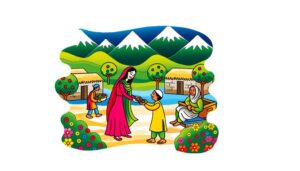Biblical Meaning of Name Naomi
The name Naomi, rooted in ancient Hebrew, translates to 'pleasantness' or 'delight,' reflecting grace and favor as common themes in biblical names. Within the Book of Ruth, Naomi exemplifies resilience and steadfast faith, maneuvering profound loss and guiding Ruth with wisdom.
Her return to Bethlehem after immense personal tragedy highlights themes of divine provision and restoration, leading to Ruth's fruitful union with Boaz. Naomi's story enriches our understanding of redemption and divine faithfulness.
To uncover the deeper layers of her legacy and the enduring lessons she offers, one should explore her journey further.

Key Takeaways
- Naomi's name means 'pleasantness' or 'delight,' reflecting a character of grace and favor.
- In the Bible, Naomi exemplifies resilience and unwavering faith amidst profound loss and challenges.
- Her journey from Bethlehem to Moab and back symbolizes themes of redemption and divine restoration.
- Naomi's guidance of Ruth highlights her wisdom and nurturing spirit, crucial for Ruth's marriage to Boaz.
- Naomi's legacy teaches steadfast faith, resilience in adversity, and the transformative power of divine provision.
Etymology of Naomi
The name Naomi, derived from the Hebrew word 'נָעֳמִי' (Naomi), translates to 'pleasantness' or 'delight' in English. This name is often associated with the biblical figure Naomi, the mother-in-law of Ruth, known for her kindness and loyalty. In modern times, Naomi is a popular name for girls, symbolizing a sweet and affable nature. Similarly, the name Gabriel meaning “God is my strength” in Hebrew, is often given to boys and is associated with the archangel Gabriel in religious traditions.
This etymological root encapsulates a sense of intrinsic beauty and joy, reflecting the cultural and theological values embedded within ancient Hebrew nomenclature.
The significance of names in biblical times extended beyond mere identification; they often conveyed profound spiritual and moral meanings.
Naomi's name, hence, is not merely a label but a reflection of a character imbued with grace and favor. It serves as a linguistic and theological anchor, encapsulating the virtue and serenity that the name implies.
Understanding Naomi's etymology enriches one's appreciation of the depth and intentionality inherent in biblical naming conventions.
Naomi in the Book of Ruth
Naomi's journey in the Book of Ruth exemplifies a narrative of resilience and faith amidst profound personal loss and societal challenges. After the death of her husband and sons, Naomi confronts the bleakness of widowhood and the instability it brings. Her decision to return to Bethlehem, despite the uncertainties, underscores her unwavering faith in God's providence.
Naomi's relationship with Ruth, her Moabite daughter-in-law, highlights her nurturing spirit and wisdom. Together, they navigate the complexities of survival and kinship. Naomi's strategic guidance in securing Ruth's marriage to Boaz demonstrates her acumen and deep understanding of cultural norms.
Ultimately, Naomi's story is a testimony to enduring faith and the transformative power of loyalty and divine provision.
Naomi's Early Life in Bethlehem
Reflecting on Naomi's profound journey of faith and resilience, it is essential to ponder her formative years in Bethlehem, which laid the groundwork for her later experiences and character. Bethlehem, meaning 'House of Bread,' was not merely a geographical location but a spiritual crucible where Naomi's virtues were nurtured.
In this fertile land, she imbibed the traditions and faith of the Israelite community, fostering a deep sense of piety and familial duty. Her early life, marked by adherence to Mosaic Law and communal solidarity, endowed her with the moral fortitude necessary for the trials she would later face.
Understanding Naomi's roots in Bethlehem illuminates her steadfastness and the profound sense of loss she endured, shaping her into a paragon of faith and perseverance.
Journey to Moab
Amidst a severe famine, Naomi and her family set out on a challenging journey to the land of Moab, seeking sustenance and survival. This decision was not taken lightly, as relocating to a foreign land often involved significant risks and uncertainties.
Moab, a region historically viewed with ambivalence by Israel, presented both hope and potential cultural tensions. The act of leaving Bethlehem, known as the 'House of Bread,' underscores the severity of the famine and the dire need for resources.
Naomi's journey to Moab thereby reflects a profound act of faith and resilience, as she navigated the complexities of displacement and adaptation. This pivotal move set the stage for subsequent events that would deeply shape Naomi's life and legacy.
Loss and Sorrow in Moab
In the narrative of Naomi's sojourn in Moab, profound loss and sorrow are pivotal themes that shape her story. The tragic deaths of her husband and sons leave Naomi bereft, encapsulating the depth of her grief and the severe trials she endures.
This period of intense suffering not only defines Naomi's personal journey but also serves as a poignant evidence to her resilience and faith amidst overwhelming adversity.
Family Tragedy Strikes Naomi
The narrative of Naomi's life takes a devastating turn when she experiences profound loss and sorrow during her sojourn in Moab. Displaced from her homeland due to famine, Naomi's trials are compounded by the death of her husband, Elimelech, leaving her a widow in a foreign land.
The subsequent deaths of her two sons, Mahlon and Chilion, further plunge Naomi into a chasm of grief and desolation.
- A widow in an unfamiliar land
- The graves of her loved ones in Moab
- Isolation amidst a foreign culture
- The fading hope of familial legacy
These tragic events shape the trajectory of Naomi's life, signifying not only personal loss but also the overarching human experience of suffering and resilience.
Naomi's Grief in Moab
Naomi's profound grief in Moab is a poignant reflection of her overwhelming sorrow and the deep-seated despair that follows the successive losses of her husband and sons. Her anguish is compounded by the alienation she feels in a foreign land, accentuating her sense of abandonment and desolation.
The name Naomi, meaning 'pleasantness,' starkly contrasts with her circumstances, as she is enveloped in a shroud of bitterness and mourning. Naomi's lament, "Call me Mara, because the Almighty has made my life very bitter" (Ruth 1:20), encapsulates her emotional turmoil and spiritual disquiet.
Her experience in Moab serves as a profound narrative on the human condition, echoing themes of loss, resilience, and the quest for divine solace amid life's trials.
Journey Through Deep Loss
Enduring profound loss, Naomi's journey through grief in Moab reveals the depths of human sorrow and the complexities of managing life amidst overwhelming despair. Naomi's story is a poignant exploration of loss, marked by:
- Bereavement of her husband and sons: Naomi's heartache magnifies the emotional toll of widowhood and childlessness.
- Isolation in a foreign land: Far from her homeland, Naomi's solitude underscores the alienation felt in times of profound grief.
- Economic hardship: The struggle for survival without her family's support highlights the intersection of loss and poverty.
- Spiritual desolation: Naomi's lamentations reflect a crisis of faith, questioning divine providence amidst her suffering.
Her narrative serves as a demonstration of enduring faith, resilience, and the unwavering quest for hope amidst life's darkest valleys.
Return to Bethlehem
As Naomi returned to Bethlehem, her journey symbolized a profound act of faith and resilience amid adversity. Having faced the devastating loss of her husband and sons in Moab, Naomi chose to return to her homeland, embodying a steadfast commitment to her roots and heritage.
This return is not merely a geographical relocation but a spiritual pilgrimage, signifying repentance and renewal. Her decision to go back to Bethlehem, meaning 'House of Bread,' during a time of famine, underscores her unwavering trust in God's providence.
Naomi's perseverance through suffering and her hope for divine intervention reflect the biblical theme of restoration, where faith in God's plan triumphs over despair. Her journey is an enduring demonstration of the power of faith and the promise of redemption.
Naomi's Role in Ruth's Life
In the intricate narrative of Ruth, Naomi emerges as a pivotal figure, guiding her daughter-in-law through cultural integration and spiritual growth. Naomi's wisdom and experience become a beacon for Ruth, who is exploring a new land and its customs. Her role transcends mere familial duty; it embodies a profound mentorship and spiritual guidance that shapes Ruth's journey.
Naomi's instruction on gleaning fields highlights her deep knowledge of their customs.
Her encouragement of Ruth to seek Boaz's protection reflects strategic thinking.
Naomi's personal transformation from bitterness to hope models resilience.
The nurturing relationship she fosters with Ruth underscores mutual respect and love.
Through Naomi, we witness themes of compassion, guidance, and the transformative power of faith in action.
Themes of Redemption
The themes of redemption in the story of Naomi are intricately woven through the narrative of Ruth and Naomi's journey from Moab to Bethlehem. This journey symbolizes a profound restoration, as Naomi evolves from a state of despair to renewed hope.
Through their experiences, we witness the transformative power of new beginnings, underscoring the biblical principle of redemption.
Ruth and Naomi's Journey
Ruth and Naomi's journey through the narrative of the Book of Ruth encapsulates profound themes of redemption and divine providence. Their story is a vivid tapestry woven with threads of loyalty, faith, and divine orchestration. As they navigate their trials, the narrative reveals God's unwavering commitment to restore and redeem.
- Naomi's journey from bitterness to hope underscores the transformative power of faith.
- Ruth's unwavering loyalty exemplifies covenantal love and the importance of kinship.
- Boaz's role as kinsman-redeemer highlights the legal and spiritual dimensions of redemption.
- The harvest season symbolizes abundance and God's provision, contrasting their initial state of famine.
Together, these elements paint a portrait of divine mercy and the unfolding of a greater redemptive plan.
Restoration and New Beginnings
Having witnessed the profound trials and unwavering faith of Ruth and Naomi, the narrative now illuminates themes of restoration and new beginnings, underscoring the redemptive arc that characterizes their journey. Naomi's return to Bethlehem symbolizes a return to God's provision. Ruth's loyalty and Boaz's kindness catalyze a transformation from desolation to abundance. Naomi, once "Mara" (bitterness), experiences renewal through God's providential care. This redemptive narrative emphasizes divine faithfulness and the transformative power of steadfast commitment.
| Theme | Significance |
|---|---|
| Restoration | Return to Bethlehem, God's provision |
| Loyalty | Ruth's devotion to Naomi |
| Kindness | Boaz's generosity |
| Transformation | From bitterness to joy |
| Divine Providence | God's overarching care and guidance |
Such themes resonate profoundly, offering timeless lessons on faith and redemption.
Naomi's Legacy and Lessons
In examining Naomi's heritage and lessons, her journey reveals profound insights into faith, resilience, and divine providence. The narrative of Naomi in the Book of Ruth serves as an enduring evidence to the transformative power of unwavering faith amidst adversity.
Her life encapsulates essential lessons that continue to inspire and instruct:
- Faith Through Trials: Naomi demonstrates steadfast faith despite immense personal loss and hardship.
- Resilience in Adversity: Her ability to navigate profound grief and displacement highlights remarkable strength.
- Divine Provision: Naomi's story illustrates the providential care that unfolds even in the bleakest circumstances.
- Mentorship and Influence: Her guidance of Ruth underscores the importance of mentorship and the lasting impact one can have on others.
Naomi's enduring heritage echoes through generations, providing a rich tapestry of divine lessons.
Conclusion
Naomi's journey, marked by profound loss and unexpected redemption, serves as a proof of resilience and divine providence. Her story, embedded within the Book of Ruth, transcends mere historical account, offering timeless lessons on faith, loyalty, and the transformative power of steadfast love.
As the narrative unfolds, one is left to ponder: might Naomi's enduring legacy hold deeper implications for understanding the intricate tapestry of human suffering and divine grace? The answers remain compellingly elusive, inviting further contemplation.






